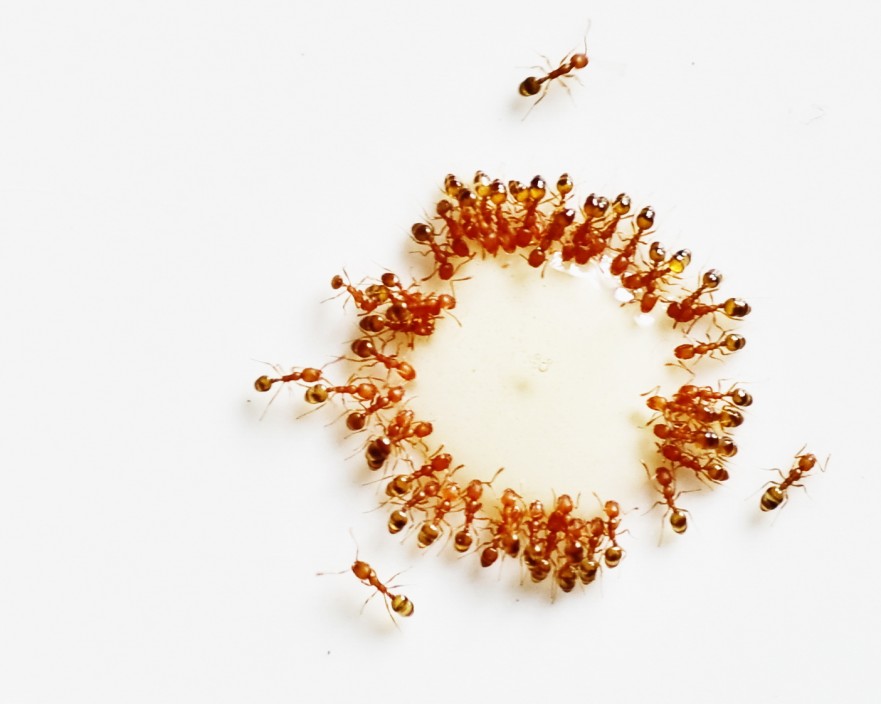Have you ever terrorized ants? I’m not talking about being malicious or cruel—I just think that ants are fun to mess with sometimes. When it comes to Mother Nature, ants are one of those tiny creatures that really amaze me. I think it’s fascinating to see how they respond to problems and challenges. Ants are always hard at work. They can carry 10-50 times their body weight. They’ve been on Earth for over 110 million years. There are over 12,500 ant species identified so far, and it’s estimated there are 22,000 species on Earth overall. From a scientific standpoint, these bugs are amazing! I think we can all learn a thing or two from ants.
A few weeks ago, I was outside watering some plants. Near my bare feet, I noticed a long trail of busy ants. I paused and examined their speedy line, each ant scurrying along the same careful path. My eyes followed their path all the way down the sidewalk beside the house. Impressive trail. Looking back at my feet, I noticed the ants were a little too close for my comfort. I sprayed the sidewalk to wash the enemy out of range. (I dig ants, but I hate ant bites!) I continued watering the plants, keeping a lookout for any brave ants to return.
About two minutes later, I noticed a few courageous little ants exploring the watery abyss of the sidewalk where their trail had once been. They were lost. It was clear. Instead of walking the straight line, they explored the damage in a zig-zag pattern that seemed confused and bewildered. A few more brave little souls joined the search. They were all walking around the wet area, searching for the path.
I stopped watering and stared at the ants with amazement. One by one, they seemed to find the path again. More and more ants returned to the area and sought out the same path. As new ants arrived on the scene, their confusion quickly transformed into the same pattern as the others. Despite the catastrophic flood, these ants were right back to work! In about five minutes, this little colony of ants had returned to business as usual.
I started thinking about how much teachers can learn from ants. In education today, many teachers probably feel like we’re carrying 10-50 times our body weight: the endless hours of work, funding shortfalls, the political war, and the sad things happening to some of the kids we serve…crushing, right?
But maybe we need to be bold and collaborative like ants. I went inside thinking about those first courageous ants who returned after the path was destroyed. Fearlessly, they came back to forge a new path from the chaos. And as they did, other ants joined to rebuild and continue the work together. When we face similar blows in education, courageous leaders and courageous followers are the key to success. And continuing the work is essential.
According to Wikipedia, ants are successful in so many environments because of “their social organization and their ability to modify habitats, tap resources, and defend themselves.” While researching this post, I read many amazing facts about ants. I learned that ants choose their roles in the colony based on their abilities and personal preferences. I read that some ants emit pheromones during attacks that confuse enemy ants, causing the enemies to attack one another! What a defense strategy! Scientists have even observed ants teaching one another about roles in the colony through interactive teaching strategies.
I think that ants could probably take some teachers to school when it comes to collaboration, adaptation, use of resources, and self-defense. So the next time I see ants at work, I’m going to stop and take detailed notes!
Need more ant facts? Check out these 100 Fun facts about ants!
PS: No ants were harmed for the writing of this blog post.
Sources:
https://en.wikipedia.org/wiki/Ant
https://askabiologist.asu.edu/content/ant-factoids
http://www.onekind.org/be_inspired/animals_a_z/ant/









